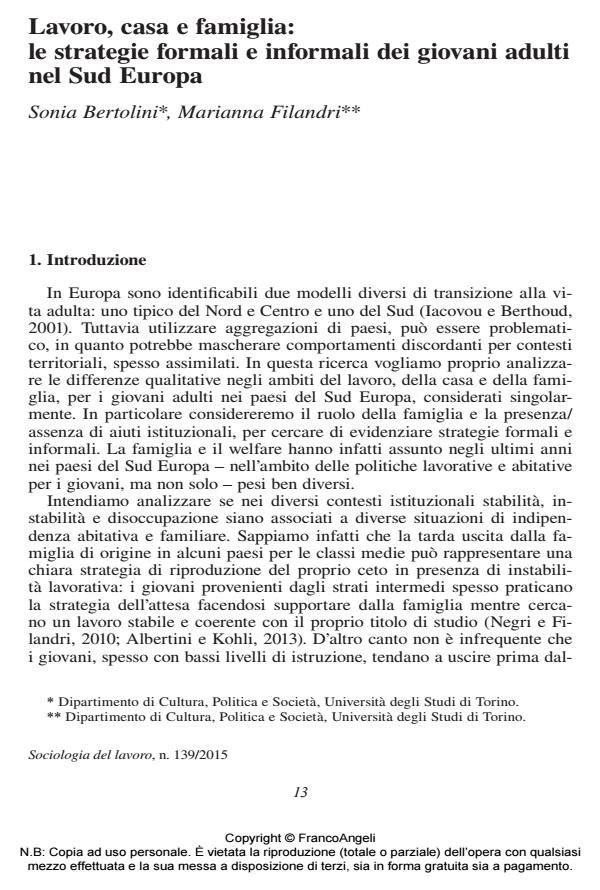Work, home and family: formal and informal strategies of young adults in Southern Europe
Journal title SOCIOLOGIA DEL LAVORO
Author/s Sonia Bertolini, Marianna Filandri
Publishing Year 2015 Issue 2015/139
Language Italian Pages 16 P. 13-28 File size 176 KB
DOI 10.3280/SL2015-139002
DOI is like a bar code for intellectual property: to have more infomation
click here
Below, you can see the article first page
If you want to buy this article in PDF format, you can do it, following the instructions to buy download credits

FrancoAngeli is member of Publishers International Linking Association, Inc (PILA), a not-for-profit association which run the CrossRef service enabling links to and from online scholarly content.
In Europe, there are two different models of transition to adulthood: one is typical of the northern and central countries and the other is typical of the countries in the south (Iacovou and Berthoud, 2001). However, grouping by countries can be problematic, in that it may mask behavior, often assimilated, that is at variance with local contexts. In this research, we want to analyze the qualitative differences precisely in the areas of work, home, and family for young adults in the southern European countries, considered individually. We will focus on the following conditions in this order: stable employment, flexible employment, and unemployment; independence as to housing and housing tenure status; living alone or in pairs. In particular, we will consider the role of the family and the presence/absence of institutional support in order to try to highlight formal and informal strategies. In recent years, the family and the welfare system in southern European countries have taken on very different burdens with regard to work policies and housing for young people, but not only that.
Keywords: Young people, work, housing, transition to adulthood, flexibility
- Tempi difficili. Le condizioni occupazionali degli early school leavers in Italia prima e dopo la crisi Camilla Borgna, Emanuela Struffolino, in SOCIOLOGIA DEL LAVORO 155/2019 pp.179
DOI: 10.3280/SL2019-155009 - Homeownership out of reach? Intergenerational transfers and homeownership reproduction in middle class families in Rome, Italy Martina Gentili, Joris Hoekstra, in Cities 103277/2021 pp.103277
DOI: 10.1016/j.cities.2021.103277
Sonia Bertolini, Marianna Filandri, Lavoro, casa e famiglia: le strategie formali e informali dei giovani adulti nel Sud Europa in "SOCIOLOGIA DEL LAVORO " 139/2015, pp 13-28, DOI: 10.3280/SL2015-139002